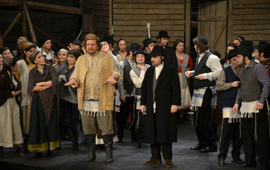> [Archived] Chronicles

'Fiddler on the Roof' in Timișoara
These aspects require some pointing out, because the premiere I saw stunned with the fact that all the singers were… admired opera singers, whom we appreciated in Tosca, Turandot, The Barber of Seville or Carmen, and who managed to sing… in a completely different way this time, a way that is adapted perfectly to the style required by Bock's music, inspired by Jewish songs and dances, without acute notes or spectacular 'rolling', yet with a deep human element. Besides, the spoken text - a very long one - belongs with the dialogue naturalness or, in the case of the protagonist - Tevye - in the long and varied monologue executed with talent and intelligence by… baritone Cristian Rudic, good musician and performer in the most adequate sense, with humour and sensitivity that he highlights subtly. All the soloists, too, deserve to be (at least) mentioned, as they made impeccable roles, living them intensely and making their characters credible, either excellent mezzosopranos Ramona Zaharia (Tzeitel) and Gabriela Varvari (Hodel), who bring a fresh and spontaneous element to girls who have reached the age of marriage, or sopranos Narcisa Brumar (Hava) and Nicoleta Colceiar (Shprintze), as well as baritone Bogdan Zahariea (Motel), whom I would not have imagined to be such expressive and convincing as an actor; not to mention baritones Dan Patacă (Lazar) and Camil Mara (Rabbi) acted casually and showed humour, as well as bass Octavian Vlaicu (Perchik) or, in roles of coloured characters, soprano Nina Zaharescu (Yente), Diana Zaharia (the grandma in the dream) or Mariana Șarba (Fruma), together with actress Alina Ilea (Golde); the entire cast proves to be extremely homogenous, making a team's show, a difficult and tiring one, where the members of the choir, too, become well-sketched prototypes, singing passionately, dancing with explosive enthusiasm that seems to spring right from the reality of that world (Laura Mare - choirmaster), the ballet dancers (with a choreography adapted perfectly by Carmen Cojocaru) integrate in this 'whole' that, after all, restores a glimpse of life.
Inviting director Gyorgy Korcsmaros (from Hungary) was a great opportunity, as he had staged Fiddler on the Roof before, in Oradea, a production that gathered unanimous appreciation, but the present show benefits from the beautiful, well-driven voices of the soloists and the 'opera' choir, which he knew how to guide smartly, step by step, movement by movement, all to an impressive result. And not just because each of them is convincing and spontaneous or because relations between them are disarmingly natural, but mostly because they create 'that' atmosphere filled with sullenness, humour and yielding before their fate, with their little joys, their great dramas, their defiance and their resignation. The ending brings tears to the eyes of the audience, without artifice or emphasis - simply by showing the villagers leave quietly, stepping slowly on the hillock behind the house that Tevye's family has a hard time leaving, carrying a suitcase or a bundle, heading towards unknown places - it is a simple, troubling experience that shows life as it is. And above all, the Fiddler (violinist-concertmaster Ovidiu Rusu) keeps playing the same sad melody, alone and nostalgic - on the roof and, with the last notes, on stage, following those who leave for nowhere…
The staging also benefited from Dragoș Buhagiar's plastic, suggestive art direction, the turntable being a new element at the Opera, which ensures the quick change of setting, making the densely flowing action ever more fluent, alert, with its contrasting levels and states, giving it a unitary artistic structure that seems 'under control' at all times. In fact, the spontaneity and naturalness that show on stage are the result of hundreds of hours of rehearsals, study and effort to tackle new territories and to become the characters they play.
That unmistakable atmosphere was also due to the collaboration with a smaller orchestra (concertmaster Corina Murgu), which sounded impeccable (as well), which had very beautiful instrumental interventions; the ensemble rose to the standard they have accustomed us with, in spite of playing a totally different type of score. Experienced conductor Peter Oschanitzky also played a pivotal role, returning to the theatre after a long time, yet just as firm and efficient as we knew him, co-ordinating the entire ensemble with precise gestures, in a landmark show that was applauded for minutes on end by an impressed and excited audience that filled the hall, (re)discovering a charming creation, although we were teary-eyed at the end.
It looks like including Fiddler on the Roof in the repertoire was a good idea, a challenge and a real event of the season (and more), with the Opera's artists, who, although exhausted by double rehearsals and the effort required by constant moving around the stage and the complex prose combined with singing, with quick passing to the expressive register, were fully rewarded by the feeling of utter achievement. And after relaxing for a few days, they will return to the Opera, preparing large-scale shows that will certainly give them another, yet… different sense of satisfaction.
Translated by Irina Borțoi
MTTLC, The University of Bucharest














